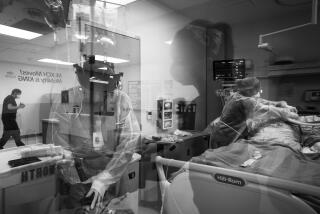Stress can wear at veterans’ health
- Share via
CHICAGO — A groundbreaking study of 1,946 male veterans of World War II and Korea suggests that vets with symptoms of post-traumatic stress disorder are at greater risk of heart attacks as they age.
The new study is the first to document a link between PTSD symptoms and future heart disease, and joins existing evidence that vets with PTSD also have more autoimmune diseases such as arthritis and psoriasis.
A second study, funded by the Army, found that soldiers returning from combat in Iraq with post-traumatic stress disorder reported worse physical health, more doctor visits and more missed workdays. The Army study is based on a survey of 2,863 soldiers one year after combat.
“The burden of war may be even greater than people think,” said the first study’s lead author, Laura Kubzansky of the Harvard School of Public Health, who studies anxiety, depression and anger as risk factors for heart disease. Her work, with colleagues from Harvard and Boston University, appears in the Archives of General Psychiatry.
Their study was funded by the National Institutes of Health and the Department of Veterans Affairs. The Army study appears in the American Journal of Psychiatry.
The possible link with heart disease didn’t surprise one Iraq veteran diagnosed with PTSD.
“It didn’t take a rocket scientist to figure out,” said John Oliveira of New Bedford, Mass., a former Navy public affairs officer and veteran of Iraq and Afghanistan. “It should also be a wake-up call that the cost to treat those of us suffering from PTSD could dramatically increase as we age.”
Medical authorities first accepted post-traumatic stress disorder as a psychiatric condition in 1980 at the urging of Vietnam veterans.
In PTSD, the body’s normal hormonal response to stress becomes trigger-happy, scientists believe. Long after traumatic events, people remain edgy, fearful and prone to nightmares and flashbacks. The continual release of adrenaline may wear down the cardiovascular system, Kubzansky said.
“It’s not enough to simply welcome them home,” she said. “They need to be tracked and watched carefully.”
The Harvard and Boston University researchers analyzed data from the Veterans Administration Normative Aging Study, a long-term research project tracking Boston-area vets.






